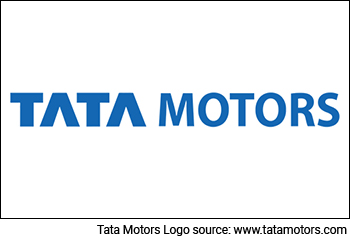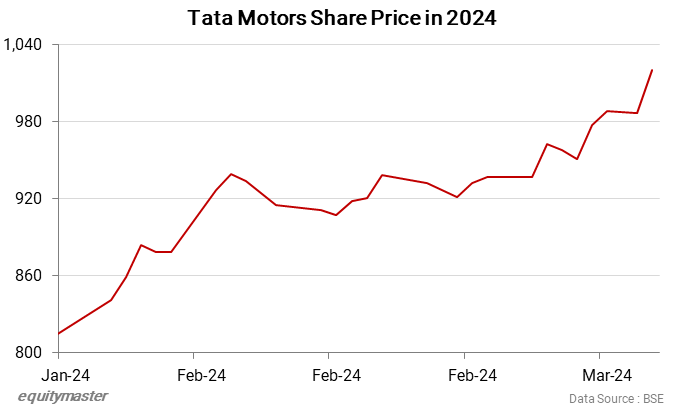- Home
- Views On News
- Mar 5, 2024 - Tata Motors Demerger: Will Shareholders Witness Value Unlocking?
Tata Motors Demerger: Will Shareholders Witness Value Unlocking?

Tata Motors has undergone a remarkable transformation in the Indian automotive landscape. After trailing behind Maruti Suzuki for seven years, the company has not only closed the gap but has surpassed its long-standing competitor, securing its status as the country's most valuable auto manufacturer.
This development closely aligns with India's recent achievement of becoming the fourth-largest stock market by market capitalisation.
However, amid this success, Tata Motors has announced a strategic shift.
On 4 March 2024, Tata Motors' board greenlit a demerger plan, a pivotal decision that will see the company bifurcating into two distinct entities.
This groundbreaking move marks a significant transformation for the automotive giant. The two entities will be independently listed, with one focusing on the commercial vehicle business and the other on the passenger vehicle sector, encompassing the esteemed British luxury car unit, Jaguar Land Rover (JLR).
Before delving deep into the demerger plan, here's a brief introduction to Tata Motors.
About Tata Motors
Tata Motors Limited is a leading global automobile manufacturer with a portfolio that covers a wide range of cars, SUVs, buses, trucks, pickups, and defence vehicles.
It's a US$ 34 bn organisation and a leading global automobile manufacturing company.
Tata Motors is one of India's largest OEMs, offering an extensive range of integrated, smart and e-mobility solutions.
Tata Motors has a strong presence in India, but it also exports its vehicles to over 100 countries. The company has several joint ventures with other automotive manufacturers, including Fiat, Jaguar Land Rover, and Daimler.
Tata Motors crosses Rs 1,000 mark today.

Demerger Plan
Tata Motors is seeking to split its passenger and commercial vehicle businesses into two listed companies.
The CV (commercial vehicle) business and related investments will be housed in one entity, while the other will include passenger cars, electric vehicles, and Jaguar Land Rover.
The demerger proposal, which will be presented to the board of directors in the coming months and subject to necessary regulatory and shareholder approvals, will be completed in 12-15 months.
The shares of the company will be split in a 1:1 ratio.
Shareholders of Tata Motors will continue to have an identical shareholding in both the listed entities, the filing stated, and it'll be business as usual post-demerger.
Rationale Behind the Demerger Move
The move was undertaken to pursue the two segments' respective strategies to deliver higher growth with greater agility while reinforcing accountability.
India's most valuable automaker looks to unlock value and turn debt-free over the next few years.
Tata Motors has a market capitalisation of over Rs 3.3 trillion (tn), having doubled in one year on the back of a strong performance in its passenger vehicles division. Tata Motors and Hyundai are currently neck to neck in a fight for the second spot in India's passenger vehicle market, currently the fourth largest in the world.
Since 2021, the commercial vehicles (CV), passenger vehicles (PV+EV), and Jaguar Land Rover businesses have been operating independently under their respective CEOs, according to a company statement.
The demerger is portrayed as a logical progression following the subsidiarisation of PV and EV (electric vehicles) businesses in 2022. This move aims to empower the respective businesses to pursue individual strategies, fostering higher growth with increased agility and reinforcing accountability.
In 2020, Tata Motors had previously decided to hive off its passenger vehicle division into a distinct entity, appointing Shailesh Chandra, responsible for Tata Motors' electric vehicle division, as its head.
The resulting entity, Tata Motors Passenger Vehicles Limited, has since driven the market capitalisation growth for Tata Motors. Currently, Tata Motors holds a 14% share in India's domestic automobile market, while its commercial business commands a market share of 41.7%.
In 2021, the company established the subsidiary Tata Passenger Electric Mobility, dedicated to housing its electric vehicles. This subsidiary has achieved a remarkable valuation of US$ 9.1 billion (bn) following investments from TPG Rise Climate.
While limited synergies exist between commercial vehicles (CV) and passenger vehicles (PV) businesses, there are substantial synergies to be harnessed across PV, EV, and JLR, particularly in electric vehicles, autonomous vehicles, and vehicle software.
The demerger is positioned as a strategic step to secure and optimise these synergies effectively.
Dissecting the Segments
Passenger vehicles, including British luxury carmaker Jaguar Land Rover, accounted for 79% of the company's Rs 3.4 tn revenue in FY23, while commercial vehicles contributed 21%.
Experiencing profitable growth across all automotive verticals, Tata Motors showcased a robust performance in the December 2023 quarter at a consolidated level.
The company reported a revenue of approximately Rs 1.1 tn, marking a 25% YoY increase. The company's operating profit stood at about Rs 158 bn, reflecting a significant surge of 60.6% YoY, and the net profit reached around Rs 71 bn.
JLR, the luxury car arm, witnessed heightened sales volumes in the third quarter of FY24 (three months ending 31 December 2023), showcasing improvements in supply and increased vehicle deliveries to clients.
The revenue for the quarter reached 7.4 bn pounds (Rs 764.1 bn), up by 22% compared to the year ago period and an 8% increase compared to the September 2023 quarter.
During the same period, JLR's wholesale volumes reached 101,043 units (excluding the Chery Jaguar Land Rover China JV), marking a 27% YoY increase and a 4% rise compared to the September 2023 quarter.
Tata Motors' PV volumes grew by 5% YoY to 1,38,600 units during Q3 FY24, supported by a robust supply situation, new SUV facelifts, and strong demand during the festive period.
The company, which launched a facelifted version of Nexon (both ICE and EV), experienced a 10.6% YoY increase in PV revenues at Rs 129 bn. The company claimed that its EV business EBITDA margins and pre-R&D spending were near break-even.
During the quarter, Tata Motors' domestic wholesale CV volumes stood at 91,900 units, exhibiting a marginal 1.1% YoY increase.
Exports stood at 4,800 units, reflecting a 14% YoY rise. Revenues surged by 19.2% YoY to Rs 201 bn due to the emphasis on medium and heavy commercial vehicles and a favourable market operating price.
During February, Tata Motors observed a 20% growth in PV sales at 51,267 units, while CVs remained a drag on a high base.
Domestic PV volumes (including EVs) grew by 19% YoY at 51,321 units, with domestic EV sales showing a 30% YoY increase at 6,923 units, contributing 13.5% to total PV sales, compared to 13% in January 2024.
In February, domestic CV sales declined by 4.5% YoY at 35,085 units, with HCV sales down by 15% at 10,091 units and intermediate, light, and medium commercial vehicle sales down by 6% at 5,083 units.
What Next?
Tata Motors has lined up US$ 2 bn to be invested by 2026 to launch 10 new EVs, including the Curvv, Harrier EV, Sierra EV, and the Avinya.
In addition, the company is setting up an ecosystem that will build everything from batteries and charging stations to financing vehicles and finally putting them on the road. No other automaker in India can currently counter that proposition.
The project, known as Tata UniEVerse, is an ecosystem that will leverage group synergies from companies such as Tata Power, Tata Chemicals, Tata Autocomp, Tata Consultancy Services (TCS), Tata Digital, Tata Elxsi, and Tata Motors Finance.
Equitymaster's Take on the Demerger
We reached out to Tanushree Banerjee, Co-Head of Research at Equitymaster on what she has to say about Tata Motor's demerger plan.
Here's what she said...
- Since Tata Motors has already tested running the passenger vehicle (internal combustion and EV), JLR and commercial vehicle businesses independently over the past three years, the demerger does not come as a surprise.
Eventually, the company could list the ICE and EV passenger vehicle segments also separately to unlock value in the latter.
The EV business, in particular could see significant R&D investments and may liaison with group entities like Tata Power and Tata Elxsi to leverage the EV ecosystem.
Conclusion
In its pursuit of driving electric vehicle (EV) penetration in India, Tata Motors holds a commendable 70%+ market share and aims to expand its EV portfolio with 10 models by FY26.
The company envisions achieving 50% of its volumes from EVs by 2030, a strategy that could result in significant value creation if successfully executed.
Following the demerger, the domestic passenger vehicle (PV) business, despite not having attained profitability at the profit after tax (PAT) level, will now find itself on par with listed counterparts such as Maruti Suzuki India.
As Hyundai's listing and Mahindra & Mahindra's emergence as the fourth rival loom on the horizon, the competition in the PV space is poised to become intriguing, providing investors with choices among the four major players.
Concurrently, the commercial vehicle (CV) business is set to encounter direct competition from firms like Ashok Leyland.
The impending Tata Motors demerger suggests that the individual parts, when considered separately, may yield greater value than the sum they currently constitute. This shift could present a unique opportunity for investors.
Nevertheless, not all demergers achieve success. Their outcomes depend on various factors, including the competence of the management team and the underlying fundamentals of the demerged entities.
Therefore, it's imperative to conduct thorough research before investing in companies that are planning demergers.
Analysing the demerger scheme, the management's intentions, and past interactions with minority shareholders, can provide valuable insights to make informed investment decisions.
Safe Stocks to Ride India's Lithium Megatrend
Lithium is the new oil. It is the key component of electric batteries.
There is a huge demand for electric batteries coming from the EV industry, large data centres, telecom companies, railways, power grid companies, and many other places.
So, in the coming years and decades, we could possibly see a sharp rally in the stocks of electric battery making companies.
If you're an investor, then you simply cannot ignore this opportunity.
Details of our SEBI Research Analyst registration are mentioned on our website - www.equitymaster.comDisclaimer: This article is for information purposes only. It is not a stock recommendation and should not be treated as such. Learn more about our recommendation services here...


Equitymaster requests your view! Post a comment on "Tata Motors Demerger: Will Shareholders Witness Value Unlocking?". Click here!
Comments are moderated by Equitymaster, in accordance with the Terms of Use, and may not appear
on this article until they have been reviewed and deemed appropriate for posting.
In the meantime, you may want to share this article with your friends!